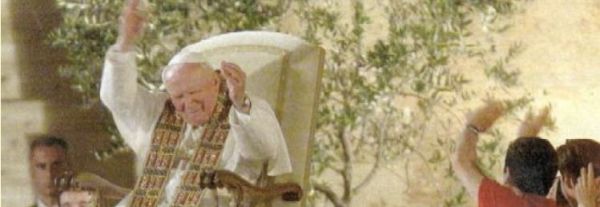7. These notions of divine providence offered to us by the biblical tradition of the Old Testament are confirmed and enriched by the New. Of all the words of Jesus that it records on this subject, particularly poignant are those recorded by the evangelists Matthew and Luke: "Therefore do not be troubled, saying, What shall we eat? What shall we drink? For your heavenly Father knows that you have need of all these things; seek ye first the kingdom of God and his righteousness, and all these things shall be given you besides" (Matthew 6: 31-33; cf. also Luke 12: 29-31).
"Will not two sparrows be sold for a penny? Yet not one of them will fall to the ground without your Father's bidding. As for you, even the hairs of your head are all counted; therefore have no fear: you are worth more than many sparrows!" (Mt 10:29-31; cf. Lk 21:18). "Look at the birds of the air: they neither sow, nor reap, nor gather into barns; yet your heavenly Father feeds them. Count ye not more than they? . . . And why do you toil for clothing? Observe how the lilies of the field grow: they neither toil nor spin. Yet I tell you that not even Solomon, with all his glory, dressed like one of them. Now if God so clothes the grass of the field, which is here today and tomorrow will be thrown into the oven, will he not do much more for you, people of little faith?" (Mt 6:26-30; cf. Lk 12:24-28).
8. With such words, the Lord Jesus not only confirms the teaching on divine providence contained in the Old Testament, but he takes the discourse further in what concerns man, every single man, treated by God with the exquisite delicacy of a father.
Undoubtedly, the stanzas of the psalms extolling the Most High as man's refuge, protection and comfort were magnificent: thus, for example, in Psalm 90: "You who dwell in the shelter of the Most High and dwell in the shadow of the Almighty, say to the Lord: 'My refuge and my fortress, my God, in whom I trust' . . . For thy refuge is the Lord, and thou hast made the Most High thy dwelling place . . I will save him, because he has put his trust in me; I will exalt him, because he has known my name. He shall call upon me and I will answer him; with him I will be in misfortune" (Ps 90:1-2. 9. 14-15)
9. Very beautiful expressions; but Christ's words attain an even greater fullness of meaning. In fact, the Son pronounces them, who "scrutinising" all that has been said on the subject of Providence, bears perfect witness to the mystery of his Father: a mystery of Providence and paternal care, which embraces every creature, even the most insignificant, like the grass of the field or the sparrows. How much more man, then! This is what Christ wants to emphasise above all. If divine Providence shows itself so generous towards creatures so inferior to man, how much more will it care for him! In this Gospel page on Providence we find the truth about the hierarchy of values that is present from the beginning in the Book of Genesis, in the description of creation: man has primacy over things. He has it in his nature and spirit, he has it in the care and attention of Providence, he has it in the heart of God!
10. Jesus also insistently proclaims that man, so privileged by his Creator, has a duty to cooperate with the gift received from Providence. He cannot, therefore, be content with the values of sense, matter and utility alone. He must seek above all "the kingdom of God and his righteousness" because "all these things (earthly goods) will be given to you as an addition" (cf. Mt 6:33).
Christ's words direct our attention to this particular dimension of Providence, at the centre of which is man, the rational and free being.
[Pope John Paul II, General Audience 14 May 1986]












